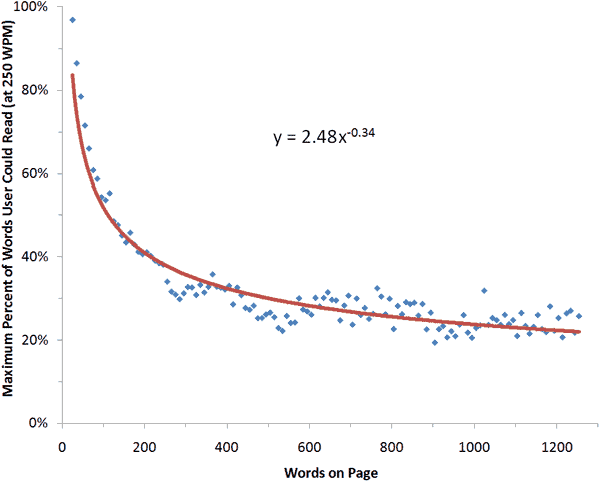Just because someone can write doesn’t mean they can write for the internet.
It’s a specific skill and one that takes a lot of practice.
Why?
Because people read differently on the internet than books, newspapers (do they exist anymore?), and any other reading.
Reading is different on the internet just as most things are different on the internet.
Reading on the internet has also changed in the last 10 years.
It used to be people were sitting at a computer or on a laptop plugged in somewhere.
Now, people are reading on their mobile device. That means tiny screens, constant scrolling, lots of distractions, and goal oriented.
How do people read on the internet?
Reading On The Internet
Reading on the internet is somewhat of an oxymoron.
People just don’t read, they skim.
Even the Nielsen Norman Group’s (NN/g) tests show that people don’t read on the internet.
Their research led them to the fact that people only read 20% of a page’s text on average.
That research was in 2008. What’s happened since 2008?
People started buying smartphones in mass.
[bctt tweet=”People only read about 20% of a web page’s text on average.” username=”exprance”]
While they were made mainstream in 2007 with the release of the iPhone, they weren’t in mainstream circulation for at least a year, maybe slightly more.
By saying people don’t read on the internet, that’s of course an exaggeration.
People do read just not very much.
There’s a lot of skimming happening and reading only titles.
If you read comments on controversial news topics you’ll see the lack of reading happening on the internet.
On mobile devices I’m sure the percentage goes down even more from 20%.
In fact, reading comprehension goes down on mobile devices for more complex topics according to NN/g.
There’s a good reason people don’t read on the internet.
Long content with huge blocks of text is intimidating. Short content is more approachable.
It’s like seeing someone with a frown on their face vs a smile. The smile is always more approachable.
What does that mean for you when you’re writing on the internet?
Don’t Make Them Read
The fact that people don’t read (yes, it is a fact) on the internet means you shouldn’t make them read.
Make your content easy to reach with a flow that makes sense.
Each section should make sense to the flow of your document and have a clear title. People should be able to find what they’re looking for on a page just by looking at section titles.
The last thing someone should be doing on your website is working.
Don’t make them read, don’t make them work, don’t aggravate your visitors with poorly written content.
Short content that’s chunked into small pieces is the best approach. We’ll get into more detail on this later.
Write For The Internet
If reading on the internet is so different from writing in general, how do you write for the internet?
Have you noticed what I’ve done in this article? I haven’t always done it.
My content is written in a way that makes it more approachable on a small screen.
Just beyond writing one word per line, I’ve written one sentence per paragraph in most cases.
[bctt tweet=”Writing short, simple sentences with lots of white space makes your text more accessible.” username=”exprance”]
It may seem a bit odd but it really does make your writing more approachable.
I was reading a conversation recently, more of a rant, about the single sentence paragraphs being annoying.
Complaints aside, after reading about people’s experiences and preferences it’s obvious it helps.
The rant mentioned that there’s usually enough white space around each sentence to “house a small family.”
While I haven’t gone the white space route, YET… I plan on adding a bit more white space because for most people it is a helpful way to read on the internet.
Your Audience Varies
Of course, the content and your audience will dictate how you write but doing it different is the exception and not the rule.
Most audiences on the internet aren’t going to read a huge wall of text at all, mobile or desktop.
Also, most people aren’t going to read something that’s not skimmable.
Writing in simple, single line sentences with lots of white space is easier to comprehend on small screen, large screens, is more approachable, and will convert better also.
According to this graph from NN/g, you can see how much more people will read of a page the fewer the words.

Fewer words aren’t always the answer but an impactful message in as few of words as possible is.
Fewer words can have a bigger impact for gaining customer leads for your small business.
Since writing for the internet is so different from writing anywhere else, sometimes you need a little help.
Make Your Content Approachable
Making your content approachable and effective to readers on the internet takes time.
Sometimes you might already be fine with how your pages are written and laid out.
The first place to start is by getting a second opinion on your content.
The free Online Presence Report I offer is a perfect opportunity for this.
When you’re writing for your small business website, you’ll be writing differently than anywhere else you’ve written.
You can forget almost all lessons you’ve ever learned about writing.
Writing for your small business website requires making your information accessible and conversion oriented.
You have to use the opportunity on every page to convert visitors by making them want to stay and convert into a lead.
I’d love to talk with you and give you a free consultation. Before you’re ready you’ll have to ask one question:
Do you want your website to look pretty or convert visitors into leads?
If your answer is convert visitors into leads, let’s talk.



